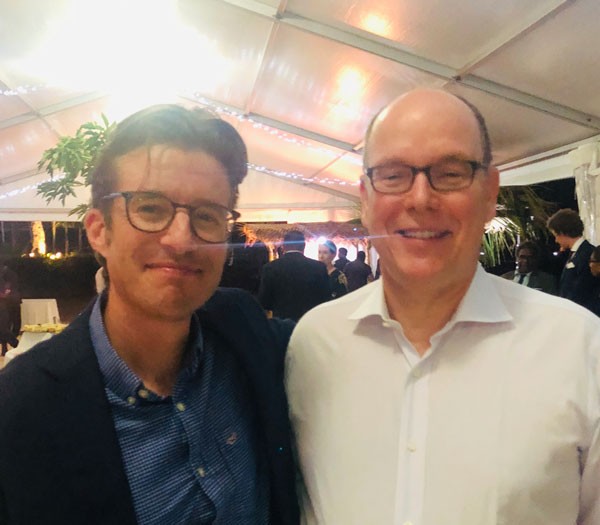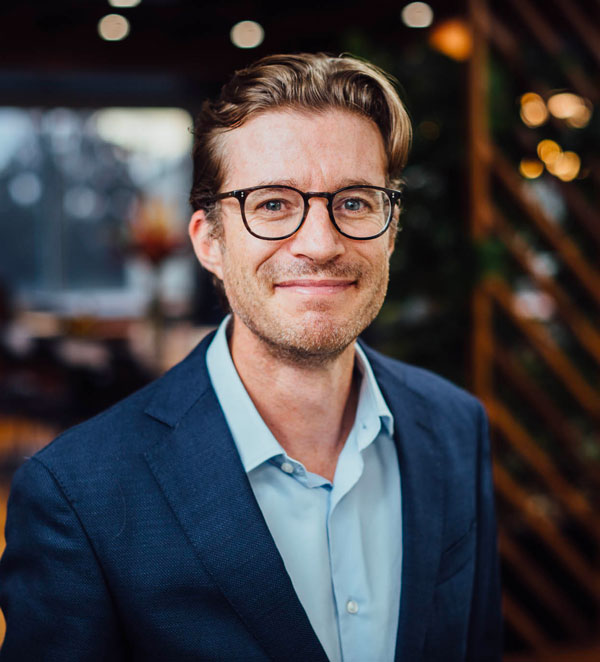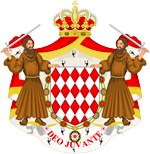
Honorary Consul of Monaco in Vanuatu
Monaco may be a tiny country half a world away, but it’s been persistent in its efforts to maintain strong ties with Vanuatu, as demonstrated by the recent appointment of Martin St-Hilaire as its honorary consul in Port-Vila.
Born in Canada in 1976, Martin moved to Vanuatu in 2003 and was naturalized Ni-Vanuatu in 2017. He’s been a key player in the country’s financial industry, first as managing director of professional services firm AJC (since 2007), then as managing director of online brokerage Titan FX (since 2018), and as Chairman of both the Financial Centre Association (since 2015) and the Financial Markets Association (since 2020). He also sits on the boards of a number of Vanuatu businesses including Pacific Private Bank, 83 Islands Distillery, Kacific Broadband Satellites, PDTC (the firm behind the Yumiwork incubator and co-working space); and he’s a partner in Singapore-based global mobility firm EC Holdings.
Due to Martin’s high profile in the community, he was deemed an ideal candidate to be appointed honorary consul by Prince Albert II of Monaco in an “Ordonnance Souveraine” dated September 7, 2022. On November 25, he received his official approval letter – or “exequatur” in diplomatic parlance – from Hon. Jotham Napat, Minister of Foreign Affairs, International Cooperation and External Trade.
Tell us what exactly is an honorary consul?
It’s a question I’m asked quite frequently. Honorary consuls are volunteer diplomats who work in their home country to represent the interests of the foreign nations that appoint them. The system has existed for centuries and there are now thousands of honorary consuls worldwide. They often fill in the gaps in places where a fully funded diplomatic mission would not make sense, as is often the case between smaller countries.
At 2.1 km2 Monaco is the second smallest state in the world after the Vatican, with a population of under 40,000, of which only 6500 are citizens. Few might ever need consular services in Vanuatu, and those who do can already receive help from the French embassy under the Franco-Monegasque agreements, so there is no need to establish a permanent mission.
One of my duties is to offer immediate assistance to any Monegasque national who may require it; but I suspect most of my time will be devoted to another important role vested in me by His Royal Highness: the promotion of Monaco.
You are not Monegasque; how come your name came up for this position?
Actually, most honorary consuls do not need to have the nationality of the country that appoints them. What’s more important is that they are knowledgeable about and well established in the consular district, and that they uphold their function with loyalty.
My wife Marie Eve is Canadian and Ni-Vanuatu like me, and she’s been the honorary consul for Sweden for many years. And my predecessor in this role, Patrick Morvan, was a French national.
Marie-Ève invited Patrick to use our offices at AJC, and that’s how she and I had the honour to be introduced to His Serene Highness Albert II during his visit to Vanuatu four years ago. When Patrick left his functions, I got in touch with Monaco authorities and offered to replace him, and they accepted. The Prince’s Standard and his official portrait are still displayed at our offices – only now with a new consul.

Why is Monaco called a “principality”?
As opposed to a Republic like Vanuatu or France, Monaco is a constitutional monarchy headed by a Sovereign Prince, who holds executive power with the Princely Government, shares legislative power with a National Council elected by the people, and delegates judicial power to independent judges.
The current Prince, Albert II, ascended to the throne following the death of his father Prince Rainier III in 2005, who famously married American actress Grace Kelly who became Princess Grace. The family, the House of Grimaldi, has quite a fascinating story.
They’ve been in charge ever since 1297 when their ancestor François seized a fortress built by the Genoese Republic. Many European forces threatened Monaco through the Middle Ages and, in 1641, it became a protectorate of France so as to better dissuade any would-be conquerors. But when the French revolution broke out it 1793, the territory was annexed, and it consequently fell under Napoleon’s rule until 1815, when it was placed under the protection of the King of Sardinia. The current Principality was finally formed in 1861, and its constitution adopted in 1911. As Monaco affirmed its status as an independent state, it took on a greater role on the global stage. It became a full voting member at UNESCO in 1949, then at the United Nations in 1993 and at the European Council in 2004. It now has diplomatic ties with 153 countries and is a member of many global organizations – as any sovereign country however tiny should.
How will your new role impact Vanuatu?
I wouldn’t have volunteered if I didn’t think Monaco had a lot to offer Vanuatu. The two countries are very different in many respects, but if you focus on the similarities, it becomes clear that Monaco can be an inspiration for our economic development.
Monaco is less populated and much smaller than Vanuatu, especially when you compare our exclusive economic zones, yet somehow it manages to churn out a massive annual GDP of US$6.8 billion – about seven times bigger than ours, with about seven times less people.
What can we learn from Monaco?
Like us, they have little to offer in the way of natural resources or labour capacity. Like us, they do not raise tax on income, on wealth, on capital gains, on real estate or on housing. Like us, they raise most of their revenue through a VAT and pay-per-use fees and duties. And that’s where the similarities end.
A key difference is their extreme degree of diversification. Administrative and support services amount to 21% of their GDP, followed by construction and real estate at 19%, financial services at 16%, wholesale businesses at 10%, accommodation and catering at 7%, retail at 7%, communications at 5%, and so on. It’s a very balanced portfolio of industries that make their economy as strong as the Rock of Monaco!
This stems from their ability to attract foreign investment, in the form of both financial and human capital. People of over 140 nationalities make up Monaco’s population today. They were seduced not only by its business-friendly tax regime, which again is similar to ours, but also by its world-class infrastructure and unparalleled security – which accounts for 20% of the principality’s budget but provides 1 police officer for 70 residents, due to the specific risks in the Mediterranean region.
Just very recently, His Serene Highness publicly reasserted that improving attractivity for investors was the main focus of His Government.
Our history and geopolitical context may be different, but the fact remains that diversification is key for small countries, and as I have long championed, Vanuatu would do well to expand far beyond agriculture and tourism. I intend to use my new role to that end.
Can we expect another princely visit soon?
The Sovereign Prince is very active in his Foundation (fpa2.org) for the protection of planetary health.
One of the Foundation’s projects, Océan-Mer de Corail 2023/2024, might bring a team of Monegasque scientists to Vanuatu to explore our unique seas. If this is confirmed, it will be a good opportunity to extend an invitation to the Prince himself, as I believe he enjoyed his last visit quite a bit. I will try my best to make it happen.


